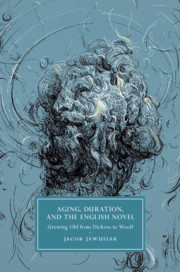Book contents
- Aging, Duration, and the English Novel
- Cambridge Studies in Nineteenth-Century
- Aging, Duration, and the English Novel
- Copyright page
- Dedication
- Contents
- Acknowledgments
- Abbreviations
- Introduction
- Chapter 1 Aging Theory
- Chapter 2 No Plots for Old Men
- Chapter 3 Life After the Marriage Plot
- Chapter 4 A Wrinkle in Time
- Chapter 5 The Technology Age
- Chapter 6 Gray Modernism
- Afterword
- Notes
- Bibliography
- Index
- Cambridge Studies in Nineteenth-Century
Introduction
Published online by Cambridge University Press: 14 November 2019
- Aging, Duration, and the English Novel
- Cambridge Studies in Nineteenth-Century
- Aging, Duration, and the English Novel
- Copyright page
- Dedication
- Contents
- Acknowledgments
- Abbreviations
- Introduction
- Chapter 1 Aging Theory
- Chapter 2 No Plots for Old Men
- Chapter 3 Life After the Marriage Plot
- Chapter 4 A Wrinkle in Time
- Chapter 5 The Technology Age
- Chapter 6 Gray Modernism
- Afterword
- Notes
- Bibliography
- Index
- Cambridge Studies in Nineteenth-Century
Summary
The book begins by outlining the representational problem of aging. Across the realist novel, the duration of aging falls out of the attempt to represent it, greatly accelerating the process of aging or writing the passage of years on the body all at once. By doing so, the novel map bodily development and decline onto the temporalities of nineteenth-century British modernity. Subsequent chapters chart this representational problem through a historical narrative that begins from the New Poor Law in 1834 to the 1860s. The pervasive optimism of these years was made possible, in part, by excluding old age from the plots novelists used to represent era. The second part turns to the growing pessimism at the end of the Victorian period, which arises not from marginalizing old age, but from using it as a figure for an exhausted century. While this has the effect of making old age central to fin-de-siècle narratives, senescence also gains new, negative connotations. Through this argument, Aging, Duration, and the English Novel aims to reorient the field age studies away from the implicit stasis of a term like “age” toward the temporal dynamism of “aging studies.”
- Type
- Chapter
- Information
- Aging, Duration, and the English NovelGrowing Old from Dickens to Woolf, pp. 1 - 20Publisher: Cambridge University PressPrint publication year: 2019



